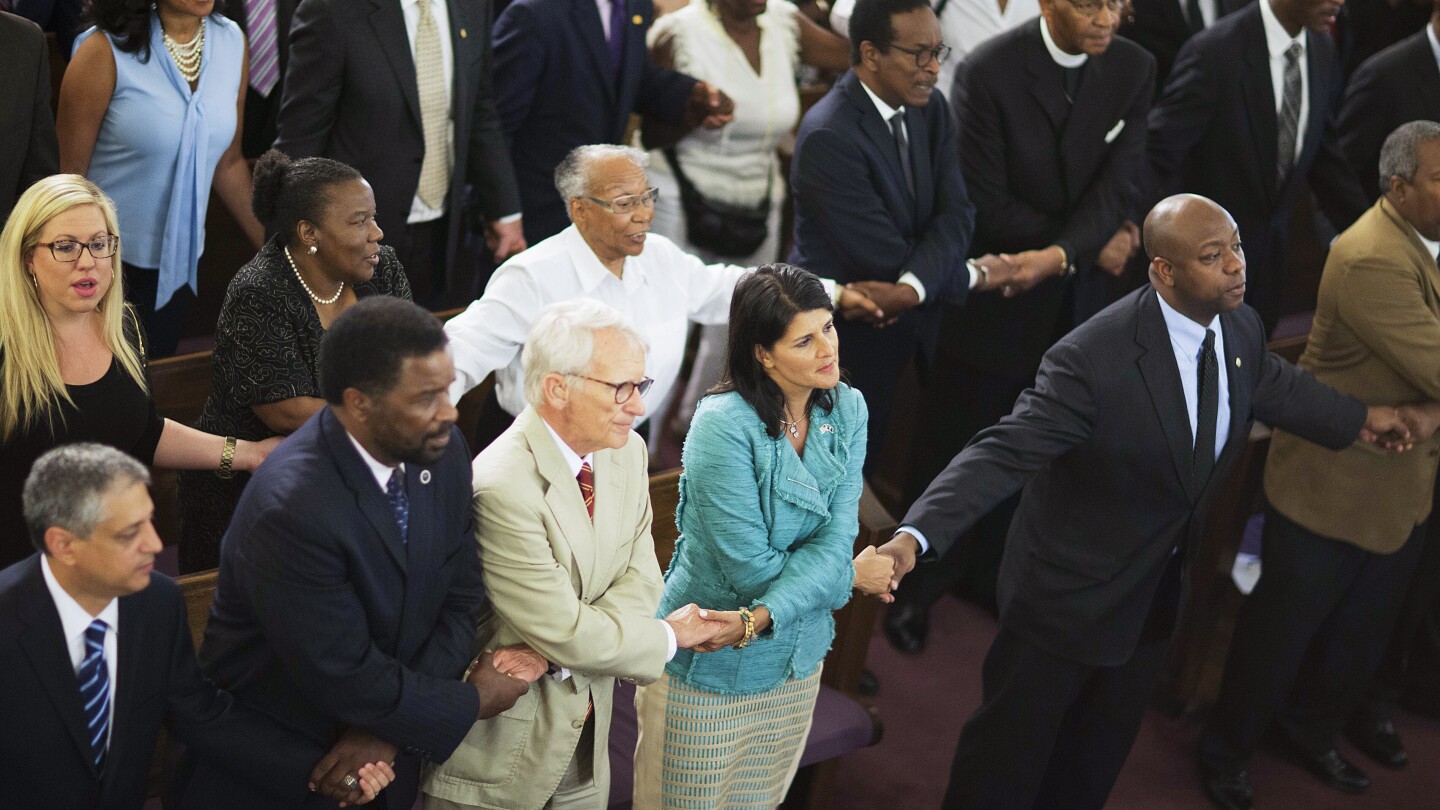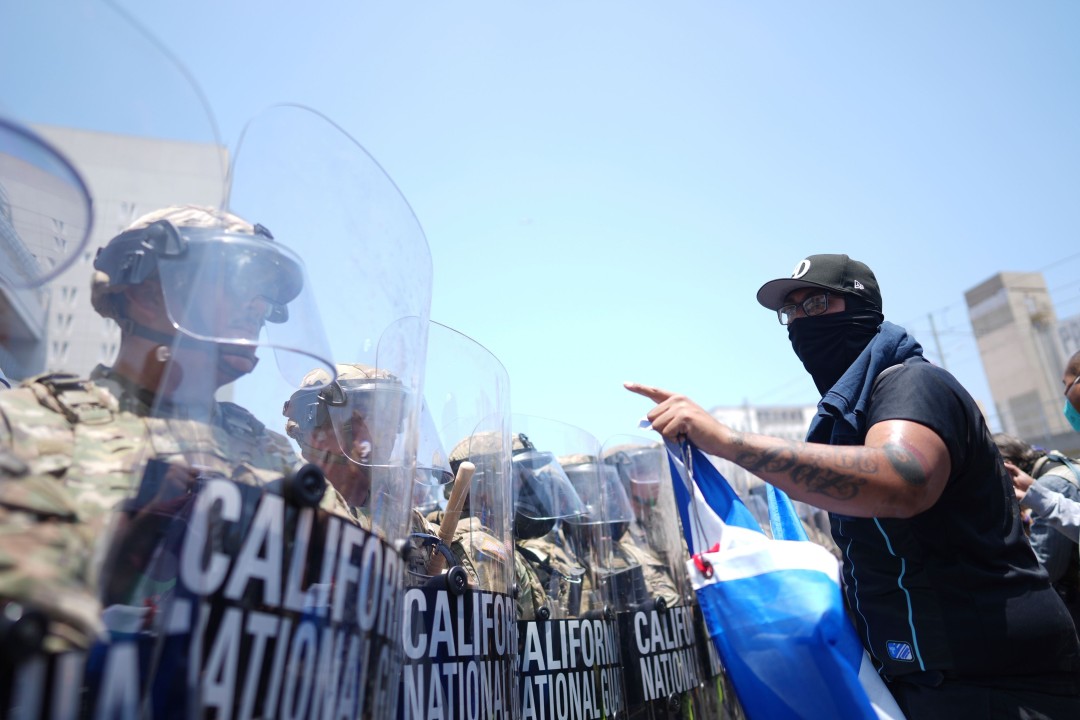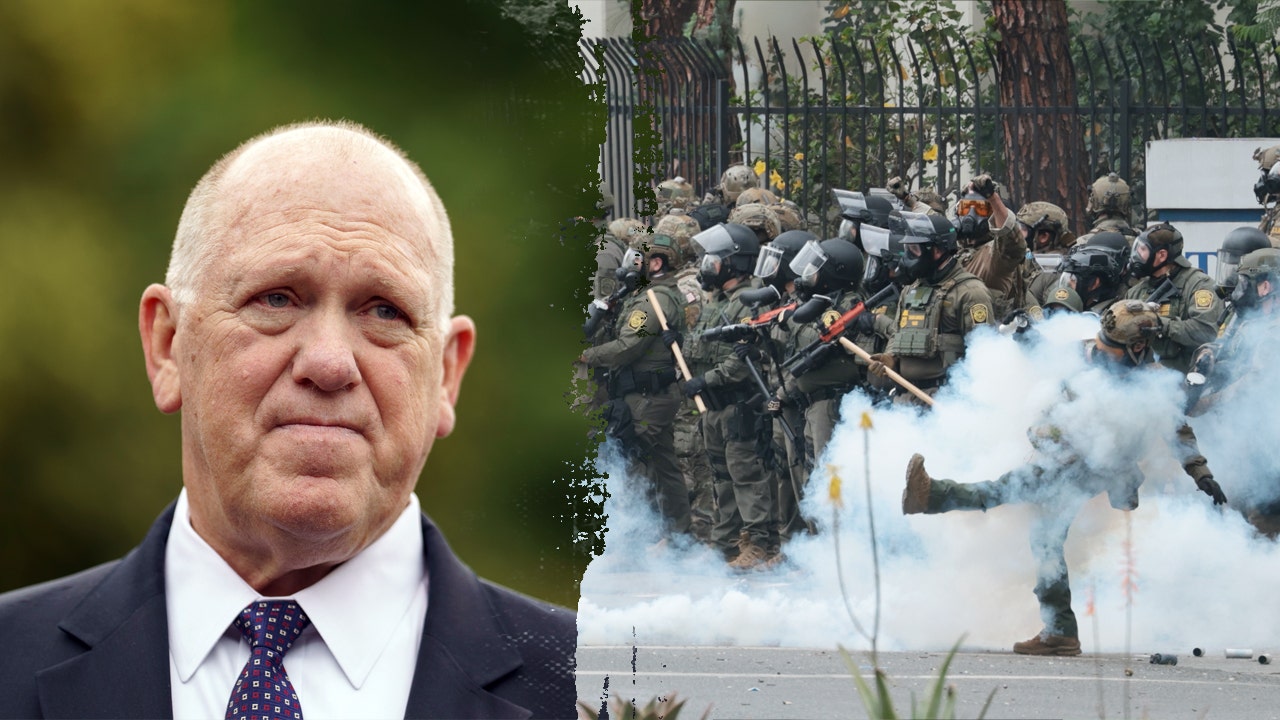South-Carolina
Can South Carolina’s Haley and Scott woo the GOP’s white evangelical base away from Trump?

CHARLESTON, S.C. (AP) — In 2015, Nikki Haley and Tim Scott attended the funerals of those slain by a racist gunman at Mother Emanuel AME Church. Scott would later tear up on the Senate floor recounting the faith of the fallen and their families. Haley would go on to write that she leaned on God and her faith deepened as she grappled with the trauma of the Charleston shooting.
If the state’s first Asian American governor and its first Black senator since Reconstruction embodied how far South Carolina has come on race, the murders of the Emanuel Nine showed just how far it has to go.
Eight years later, the region around Charleston, known as the Holy City, is home to the two Republicans’ presidential campaigns. Scott grew up in North Charleston, and after leaving her post as U.N. ambassador, Haley moved to nearby Kiawah Island.
Both are still waiting for a breakthrough moment, possibly in the first GOP debate on Wednesday. Both have been part of influential S.C. churches, and as candidates of color must appeal to their party’s white evangelical base to have a prayer against former President Donald Trump, whose hold on the GOP and its Christian voters remains strong.
“These two have managed to make their mark nationally, in part because they are candidates of color, and they have done it without emphasizing that fact,” said Danielle Vinson, a political science professor at Furman University. “It’s still a bit of a necessity in a Republican Party that wants to focus on a colorblind society that has made great strides.”
For Haley, an Indian American raised Sikh before converting to mainline Christianity, faith is just one of many differences she learned to navigate as “a brown girl in a black-and-white world,” as she likes to say.
For Scott, raised in the Black church tradition by his single mother before becoming a born-again Christian, faith is a central part of his pitch. He is counting on his fellow evangelicals to help him in the crowded GOP field.
On a recent Sunday in August, while Scott was on the campaign trail, nearly 6,000 people gathered at his home congregation — the flagship location of Seacoast Church in the well-heeled suburb of Mt. Pleasant. The congregation, like the neighborhood, is predominantly white. With 14 locations, it reaches nearly 21,000 people in-person and online every weekend.
“Here, Tim’s just Tim,” said Jack Hoey III, the church’s creative director.
Founding pastor Greg Surratt said he has met monthly with Scott for more than two decades. Scott has served on the church board and for a time considered leaving politics for the ministry.
“He and I both tell the story differently and kid each other about it. He says I fired him before he got a job,” Surratt said, recalling how he counseled Scott to stay in politics.
“I said, ‘Tim, we’d love to have you, but you have a bigger platform in your future, and I think that politics is going to be your platform.’ I really felt at that time that someday he would be a national voice.”
Shortly after Scott became a senator, Surratt got a call on a Monday from the church’s facilities director. The senator, he learned, was in the men’s restroom scrubbing the floor.
“He really felt like if he was going to serve in a public way in high levels, he needed to serve in low levels where no one was going to see him,” Surratt said.
Two hours inland from Seacoast sits Mount Horeb, South Carolina’s largest Methodist church and Haley’s longtime spiritual home when she lived in Lexington County.
“I’ve been blessed to see how God has been at work in Governor Nikki Haley’s life over the years,” wrote the church’s pastor, the Rev. Jeff Kersey, in an email. “I believe her faith guides and inspires her compassion, courage, and convictions.”
Kersey added, “I am concerned that the decisions Mt. Horeb has made concerning our convictions and compassions have been and will be politicized when it comes to Governor Haley.”
This year Mount Horeb left the United Methodist Church — part of a wave of conservative congregations defecting because they don’t support LGBTQ unions or pastors. Mount Horeb has joined the newly formed Global Methodist Church, and hosted the state’s first GMC conference.
Kersey prayed at a service before Haley’s first inauguration. Back then, Haley had walked a fine line between honoring her Sikh heritage and professing her Christian faith. A state legislator had called her a racial slur, and whisper campaigns about her religion abounded. Her website was revised to mention not only her belief in God but also Christ.
Haley’s parents — from prominent families in Punjab — immigrated to rural South Carolina where her father taught at Voorhees, a historically Black college. They stood out: He wore a turban and her mother a sari. When her parents’ place of worship, called a gurdwara, opened a new building in 2013, Haley spoke.
“I don’t feel like I’m standing here as your governor,” she told the crowd. “I feel like I’m standing here as the little girl that you raised. I see all my uncles and aunties here.”
Her parents taught her that there was more than one path to God. She was married in both Sikh and Christian ceremonies. Unlike GOP presidential hopeful Vivek Ramaswamy, who remains Hindu, Haley converted.
“We chose Christianity because of the way we wanted to live our life and raise our children,” she told The New York Times in 2012.
Like fellow GOP candidate Ron DeSantis, Haley doesn’t wear her faith on her sleeve. Longtime aides say she isn’t one to quote Bible verses, but religion is important to her.
At the U.N., Haley championed religious minorities, and she has forged ties with evangelical leaders, particularly Christian Zionists like John Hagee, head of Christians United for Israel.
On the stump, her ally-turned-rival Scott sounds like the preacher he didn’t become. Except for Mike Pence, no other candidate touts their evangelical bonafides like Scott.
As a college student, Scott had an evangelical conversion experience at Fellowship of Christian Athletes. His speeches invoke both his Black Baptist roots and the upbeat tenor of evangelicalism.
“The way he speaks about encouragement, opportunity, optimism, finding our best selves, so much of it is resonant with the language and the feel of a modern megachurch,” said Melani McAlister, American studies professor at George Washington University. “Listening to him, I thought he could be Joel Osteen.”
When discussing personal hardships or tragedies like the Charleston church shooting, Haley and Scott prefer to focus on the positive, denying that America is structurally and irredeemably racist.
“I know America is a land of opportunity, not a land of oppression,” Scott says in his speeches.
The Rev. Joseph Darby of Nichols Chapel AME knows Mother Emanuel touched anyone “with a heart,” especially South Carolinians like Haley and Scott.
But Darby, who mentored Emanuel pastor Clementa Pinckney, who was killed in the attack, takes issue with a “kumbaya response” that emphasizes the Black community’s forgiveness at the expense of systemic change.
“There wasn’t a moment of revelatory grace extended to the Black community beyond the Emanuel event,” said Darby, also a Charleston NAACP leader. “We have not seen Senator Scott much. We’ve not seen Governor Haley much. They are appealing to white evangelicals, following the GOP party line.”
The GOP party line still leads straight to Trump, according to polls. Haley and Scott are in low single digits nationally.
Chip Felkel, a former GOP strategist in South Carolina and a Never-Trumper, wishes Scott and Haley — along with religious leaders — would come out stronger against Trump.
“In a state like South Carolina, until religious leaders are willing to engage as forcibly against him as they have been for him, he’s still going to be in good shape.”
___
Associated Press religion coverage receives support through the AP’s collaboration with The Conversation US, with funding from Lilly Endowment Inc. The AP is solely responsible for this content.

South-Carolina
SCHP: 3 dead after multi-vehicle wrong-way crash on I-85 in Spartanburg Co.

SPARTANBURG COUNTY, S.C. (FOX Carolina) – The South Carolina Highway Patrol reports a multi-vehicle crash on I-85 killed three people on Sunday.
SCHP said a 2015 Honda Sedan was traveling the wrong way on I-85 North around 12:15 a.m. when it hit a 2019 Toyota Sedan head-on near mile marker 75.
The Honda driver and the two occupants of the Toyota all died at the scene, according to troopers.
The Honda also hit a 2024 Ford Expedition, but its driver and five passengers were not injured, troopers said.
The victims of the crash have not yet been identified.
The South Carolina Highway Patrol and the Spartanburg County Coroner’s Office are continuing their investigation.
Copyright 2025 WHNS. All rights reserved.
South-Carolina
South Carolina Gamecocks Boast Top Transfer Portal Class in College Baseball

The South Carolina Gamecocks currently hold the best transfer portal class in college baseball.
The South Carolina Gamecocks had a disapointing season on the baseball diamond this year after finishing second to last in the conference. That has led to a litany of players entering the transfer portal, so something need to go South Carolina’s way to start building momentum. They have finally found some.
With the transfer portal open, Paul Mainieri and his staff have been making moves of their own. They currently have six players committed with 17 total players leaving the roster. Those six players committed though have the Gamecocks sitting at the top of the transfer portal class rankings.
Four of the transfers committed to South Carolina are top 250 players. That’s more than any other program in the top 10. That’s significant considering two of the players that have left the roster were also top 250 players.
The transfer portal has become a pivotal portion of college sports, but baseball especially. Georgia’s head coach Wes Johnson has utilized it to get the program into postseason play in the first two years he was there. Tennessee’s Tony Vitello signed Andrew Fischer and Liam Doyle out of the portal and they have arguably been the best two players on the team.
If Mainieri and his staff can continue to crush the portal like they have so far, they will be in good shape heading into the 2026 college baseball season. The portal will remain open until July 1st.
Join the community:
You can follow us for future coverage by clicking “Follow” on the top right-hand corner of the page. Also, be sure to follow us on X at @GamecocksDigest and on Facebook!
You Might Also Like:
South-Carolina
South Carolina Picks Up Commitment From Sacred Heart Right Hander

South Carolina picks up another commitment out of the transfer portal this week as right hander Elijah Foster announces his decision to come to Columbia on Instagram.
Foster spent the last two seasons in Fairfield, Connecticut, playing for the Pioneers. The 6-foot and 190 pound sophomore out of Plainfield, New Jersey, was 5-3 in 15 starts on the mound in 2025. Foster had a 5.23 ERA in 72.1 innings pitched, with 76 strikeouts, and 42 runs given up.
South Carolina is no stranger to Foster’s game on the mound. The Gamecocks and Pioneers matched up for the opening series in 2025, where Foster was the game two starter for Sacred Heart. He would go on to have a rough outing in his first start of 2025. The Pioneers would make a pitching change after the third inning of Foster’s start. He would finish giving up six earned runs (nine in total), three strikeouts, and six walks.
The Gamecocks are retooling a roster that has lost 15 players in the transfer portal since it opened on June 2. Foster joins fellow pitchers Josh Gregoire, Cullen Horowicz, and Amp Phillips as additions to the pitching staff this portal cycle.
Join the community:
You can follow us for future coverage by clicking “Follow” on the top right-hand corner of the page. Also, be sure to follow us on X at @GamecocksDigest and on Facebook!
You Might Also Like:
-

 News1 week ago
News1 week agoVideo: Faizan Zaki Wins Spelling Bee
-

 Politics1 week ago
Politics1 week agoMichelle Obama facing backlash over claim about women's reproductive health
-

 Technology1 week ago
Technology1 week agoOpenAI wants ChatGPT to be a ‘super assistant’ for every part of your life
-

 Technology1 week ago
Technology1 week agoSEC drops Binance lawsuit in yet another gift to crypto
-

 Movie Reviews1 week ago
Movie Reviews1 week agoThe Verdict Movie Review: When manipulation meets its match
-

 Technology1 week ago
Technology1 week agoWhy do SpaceX rockets keep exploding?
-

 News1 week ago
News1 week agoOil companies face a wrongful death suit tied to climate change
-

 World1 week ago
World1 week agoTwo killed in Russian attacks on Ukraine before possible talks in Turkiye

















